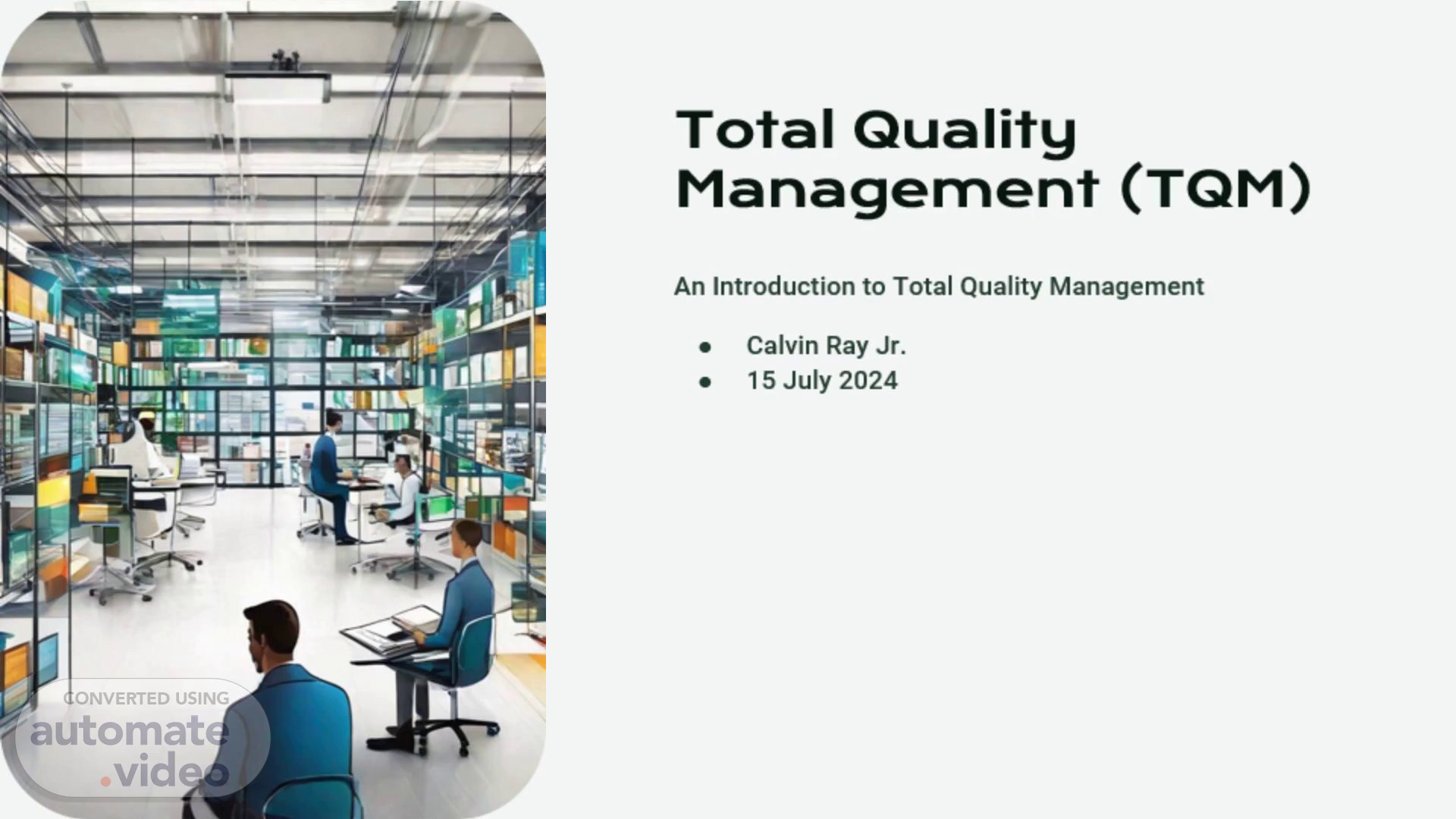
Total Quality Management (TQM)
Scene 1 (0s)
[Audio] "Hello everyone, my name is Calvin Ray, and today I will be presenting on Total Quality Management, or TQM. TQM is a comprehensive management approach that focuses on improving the quality of an organization's outputs, including goods and services. Our goal today is to understand how TQM can significantly enhance organizational performance and customer satisfaction.".
Scene 2 (26s)
[Audio] "Let's start with the key concepts of TQM. Conformance to specifications ensures that products meet predefined standards, which is crucial for maintaining consistency and reliability. Fitness for use means that products must meet the actual needs and expectations of customers, ensuring they are practical and effective. Value for price paid emphasizes providing quality products at a fair and competitive price, making customers feel they are getting good value. Support services refer to the assistance provided to customers post-purchase, ensuring their satisfaction and loyalty. Finally, psychological criteria involve the emotional response customers have towards the product, which can influence their overall perception and satisfaction.".
Scene 3 (1m 14s)
[Audio] "Now, let's discuss the principles of TQM, particularly focusing on the cost of quality. Prevention costs are incurred to prevent defects before they occur. This includes training, process improvement, and preventive maintenance. Appraisal costs are related to measuring and monitoring activities, such as inspections and testing, to ensure quality standards are met. Internal failure costs arise when defects are found before the product reaches the customer, including rework and scrap costs. External failure costs are incurred after the product has been delivered to the customer and include returns, repairs, and warranty claims. Understanding and managing these costs is essential for maintaining high quality and minimizing expenses.".
Scene 4 (2m 3s)
[Audio] "The Plan-Do-Study-Act cycle is a fundamental methodology in TQM. During the 'Plan' phase, we identify an opportunity for improvement and develop a plan to implement changes. In the 'Do' phase, we implement the change on a small scale to test its effectiveness. The 'Study' phase involves analyzing the data collected during the 'Do' phase to determine if the change led to the desired improvement. Finally, in the 'Act' phase, if the change was successful, we implement it on a larger scale and continuously monitor the results. This cycle ensures that improvements are data-driven and systematically implemented.".
Scene 5 (2m 46s)
[Audio] "Implementing TQM offers numerous benefits to organizations. Improved customer satisfaction is achieved by consistently delivering high-quality products and services that meet or exceed customer expectations. Reduced costs come from increased efficiency, waste reduction, and fewer defects. Enhanced employee morale results from involving employees in the improvement process and empowering them to take ownership of their work. Better decision-making is facilitated by using data and analysis to guide actions. Finally, TQM helps organizations maintain and improve their market competitiveness by continuously innovating and improving their processes and products.".
Scene 6 (3m 29s)
[Audio] "In conclusion, Total Quality Management is a powerful approach that integrates quality into every aspect of an organization. By focusing on key concepts, managing the cost of quality, and utilizing effective methodologies like the Plan-Do-Study-Act cycle, organizations can achieve significant improvements in performance and customer satisfaction. TQM is not just a one-time effort but a continuous commitment to excellence. Thank you for your attention, and I'm now happy to take any questions you may have.".
Scene 7 (4m 0s)
[Audio] "Now, I would like to open the floor for any questions you might have about Total Quality Management. Please feel free to ask anything you're curious about or need further clarification on.".